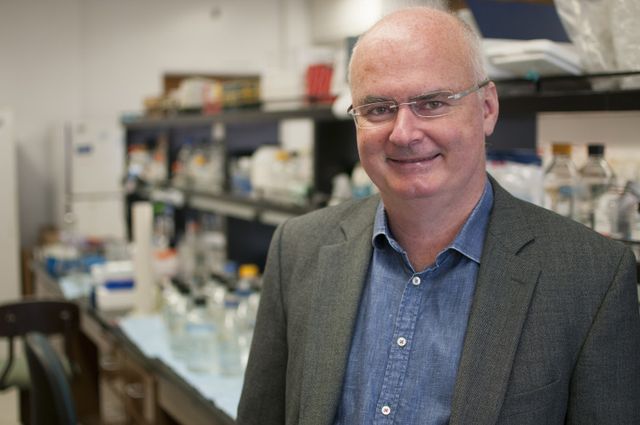Sessions
Molecular & Cellular Immunology
Molecular and cellular immunology explores the fundamental mechanisms that define immune system function, focusing on how immune cells develop, communicate, and coordinate responses. It examines molecular pathways, receptor interactions, and intracellular signaling events that regulate immunity. This topic highlights the roles of T cells, B cells, dendritic cells, macrophages, and NK cells in pathogen detection, antigen presentation, and effector responses. The field also investigates cytokines, chemokines, and transcriptional networks that guide immune cell activation and differentiation. Advances in single-cell sequencing, proteomics, and imaging have transformed our understanding of immune cell behavior at unprecedented resolution. Research in this area provides the foundation for innovations in vaccines, immunotherapies, and precision medicine. By integrating molecular biology with cell biology, scientists aim to map immune regulatory circuits, uncover dysregulation in disease states, and design targeted interventions that restore immune balance or enhance protective immunity.
Innate and Adaptive Immune Mechanisms
Innate and adaptive immune mechanisms represent two coordinated arms of host defense that protect the body from infections and maintain tissue homeostasis. Innate immunity acts as the first line, involving physical barriers, pattern-recognition receptors, complement proteins, neutrophils, macrophages, and NK cells. These components provide rapid, nonspecific responses while shaping the quality of adaptive immunity. Adaptive immunity, mediated by T and B lymphocytes, generates antigen-specific responses, immunological memory, and long-term protection. This topic emphasizes how innate sensing activates downstream pathways leading to T-cell priming, antibody production, and clonal expansion. It explores mechanisms of tolerance, immune exhaustion, and memory formation under different physiological conditions. Understanding the communication between innate and adaptive systems is critical for designing effective vaccines, improving immunotherapies, and controlling hyperinflammatory or immunodeficient states. Cutting-edge research continues to reveal how these two branches integrate through cytokines, costimulatory signals, and metabolic cues to generate balanced immune responses.
Immunogenetics & Epigenetic Regulation
Immunogenetics and epigenetic regulation investigate how genetic variants and chromatin modifications shape immune system development, diversity, and responsiveness. This field studies the impact of HLA genes, T-cell receptor and immunoglobulin gene rearrangements, and genetic polymorphisms that influence susceptibility to infectious diseases, autoimmunity, allergies, and cancer. Epigenetics—through DNA methylation, histone modifications, and non-coding RNAs—controls how immune genes are activated or suppressed in different contexts. Environmental exposures, infections, diet, and aging can reprogram epigenetic landscapes, altering immune cell fate and function. Researchers focus on mechanisms that drive immune memory, tolerance, and lineage commitment, and how dysregulated epigenetics contributes to chronic inflammation and immune-mediated diseases. Advances in CRISPR technology, chromatin profiling, and multi-omics are enabling precise interrogation of gene regulation in immunity. This knowledge supports the development of personalized immunotherapies, epigenetic drugs, and diagnostic biomarkers based on genetic and epigenetic signatures.
Autoimmune & Inflammatory Disorders
Autoimmune and inflammatory disorders arise when the immune system mistakenly targets host tissues or sustains uncontrolled inflammation. This area explores mechanisms leading to loss of tolerance, autoantibody production, and aberrant activation of T and B cells. Conditions such as rheumatoid arthritis, lupus, multiple sclerosis, and inflammatory bowel disease involve complex interactions between genetics, environment, microbiome imbalance, and dysregulated signaling pathways. Chronic inflammation is driven by cytokines, inflammasomes, and altered cellular communication that perpetuate tissue damage. Research focuses on identifying triggers, understanding immune checkpoints that fail, and mapping pathways that maintain tolerance. Advances in biologics, JAK inhibitors, and targeted therapies are transforming patient care. Scientists aim to refine biomarkers for early diagnosis, predict therapeutic response, and design interventions that restore immune equilibrium. Integrating molecular insights with clinical data is essential for developing personalized approaches to manage autoimmune and inflammatory diseases.
Immunotherapy & Immune Modulation
Immunotherapy and immune modulation encompass strategies designed to enhance, suppress, or redirect immune responses for therapeutic benefit. This field has revolutionized treatment for cancer, chronic infections, and autoimmune conditions. Approaches include checkpoint inhibitors, CAR T-cell therapies, monoclonal antibodies, cytokine therapies, and immune tolerance–inducing agents. Research examines how to overcome immune evasion, improve T-cell persistence, and minimize toxicities such as cytokine release syndrome. Immune modulation also involves therapies that suppress harmful inflammation or restore regulatory pathways in autoimmune diseases. Cutting-edge work focuses on personalized immunotherapies guided by biomarkers, neoantigen profiling, and tumor or disease-specific immune signatures. Combining immunotherapy with radiation, targeted drugs, or metabolic modulators is showing promising synergistic effects. Understanding the balance between activation and regulation is key to designing more durable, precise, and safe therapeutic strategies.
Cancer Immunology & Tumor Microenvironment
Cancer immunology investigates how the immune system interacts with tumors, while tumor microenvironment (TME) studies the complex ecosystem surrounding cancer cells. This topic explores how tumors evade detection through immune checkpoints, altered antigen presentation, suppressive cytokines, and regulatory cell recruitment. The TME comprises immune cells, fibroblasts, vasculature, extracellular matrix, and metabolic conditions that shape tumor progression. Research addresses mechanisms of T-cell exhaustion, macrophage polarization, NK cell dysfunction, and the role of stromal elements in resistance to therapy. Advances in checkpoint inhibitors, CAR T-cell therapies, and personalized vaccines are transforming cancer treatment. Scientists are increasingly focusing on strategies to reprogram the TME, enhance tumor immunogenicity, and overcome barriers that limit immune cell infiltration. Multi-omics and single-cell technologies are providing insights into tumor–immune dynamics, supporting the development of next-generation immunotherapies and combination treatments.
Infectious Diseases & Host–Pathogen Interactions
This topic examines how pathogens such as viruses, bacteria, fungi, and parasites interact with host immune defenses. Understanding host–pathogen interactions is essential for controlling infectious diseases, emerging outbreaks, and antimicrobial resistance. Research focuses on pathogen immune evasion strategies, host sensing mechanisms, and molecular pathways that regulate inflammation and immunity. Advances in genomics, structural biology, and single-cell analysis are shedding light on pathogen evolution, antigenic variation, and cellular tropism. Host factors—including genetics, microbiome composition, and immune memory—significantly influence disease severity and outcomes. This area also explores mechanisms of chronic infection, persistent inflammation, and immune exhaustion. Findings contribute to vaccine design, antiviral and antibacterial therapies, and predictive models of infection dynamics. Integrating pathogen biology with host immunity provides tools for developing more effective prevention and treatment strategies.
Vaccines & Vaccine Technology
Vaccine research continues to advance with transformative technologies such as mRNA platforms, viral vectors, nanoparticle vaccines, and recombinant protein strategies. This field explores antigen discovery, adjuvant development, immune response profiling, and methods to enhance durability and breadth of protection. Scientists investigate how vaccines stimulate innate and adaptive immunity, generate memory responses, and overcome challenges such as antigenic drift, immunosenescence, and immune evasion. The global focus on pandemic preparedness has accelerated innovations in rapid vaccine design, scalable manufacturing, and thermostable formulations. This topic also addresses safety evaluation, clinical trial development, and strategies for improving vaccine equity. Novel delivery systems—including intranasal vaccines, microneedle patches, and lipid nanoparticles—are expanding possibilities for targeted and noninvasive immunization. Insights from immunology, genomics, and systems biology are enabling next-generation vaccines with improved efficacy and personalization.
Stem Cells & Regenerative Immunology
Stem cells and regenerative immunology explore how stem cell biology intersects with immune system function, tissue repair, and therapeutic regeneration. Research focuses on hematopoietic stem cell differentiation, immune cell lineage development, and stem cell transplantation for treating immune disorders and malignancies. This field examines how immune cells regulate tissue healing, inflammation resolution, and regeneration across organs. Advances in iPSCs, organoids, and gene editing are enabling precise modeling of immune disorders and personalized cell-based therapies. Investigators are uncovering how immune dysregulation impairs regeneration and how manipulating stem cell pathways can restore homeostasis. Regenerative immunology also includes developing immune-compatible grafts, engineering cells for improved engraftment, and designing therapies that modulate inflammation to promote repair. Integration of biomaterials, tissue engineering, and immunotherapy is opening new avenues for treating chronic diseases, injuries, and degenerative conditions.
Cellular Signaling & Cell Fate Determination
Cellular signaling and fate determination investigate the molecular cues that guide immune and non-immune cells toward distinct functional states. Signaling pathways—including JAK/STAT, NF-κB, MAPK, and Notch—control activation, differentiation, proliferation, and apoptosis. This field explores how transcription factors, epigenetic regulators, and metabolic programs converge to shape cell identity. Immune cell fate decisions, such as T-cell differentiation into effector, memory, or regulatory subsets, depend on intricate networks influenced by cytokines, antigen strength, and microenvironmental signals. Advances in live-cell imaging, single-cell multi-omics, and computational modeling have enhanced understanding of dynamic signaling processes. Dysregulated signaling contributes to cancer, autoimmunity, and immunodeficiency, making these pathways key therapeutic targets. Understanding how cells integrate signals to make fate decisions provides insights for designing interventions that modify immune responses, improve regenerative capacity, and correct pathological states.
Immunometabolism
Immunometabolism examines how metabolic pathways shape immune cell activation, differentiation, and function. Immune responses require dynamic shifts between glycolysis, oxidative phosphorylation, fatty acid metabolism, and amino acid utilization. This topic explores how metabolic reprogramming influences T-cell exhaustion, macrophage polarization, memory formation, and inflammatory responses. Environmental factors—including nutrients, hypoxia, and metabolites from the microbiome—play key roles in modulating immunity. Abnormal metabolic states contribute to chronic inflammation, obesity-related immune dysfunction, and cancer progression. Advances in metabolomics, metabolic imaging, and targeted inhibitors are enabling deeper insights into metabolic control of immunity. Therapeutic strategies aim to modulate immune metabolism to enhance antitumor immunity, restore tolerance in autoimmune diseases, and improve vaccine responses. Understanding the interplay between metabolism and immunity offers new opportunities for precision therapeutics.
Neuroimmunology & Brain–Immune Interactions
Neuroimmunology examines the bidirectional communication between the immune system and the nervous system. Microglia, astrocytes, peripheral immune cells, and cytokines play critical roles in shaping brain development, neuroinflammation, and neural repair. This field investigates how immune dysregulation contributes to neurodegenerative diseases, psychiatric disorders, infections of the nervous system, and traumatic brain injury. Emerging research highlights how stress, microbiome signals, and systemic inflammation influence neural function and behavior. Conversely, neuronal signals can regulate immune responses and tissue homeostasis. Tools such as advanced neuroimaging, single-cell sequencing, and neural–immune interface models are transforming understanding of neuroimmune pathways. Insights gained are driving the development of targeted therapies for conditions like multiple sclerosis, Alzheimer’s disease, and neuroinflammatory syndromes, with a focus on restoring balance between the brain and immune system.
Allergy, Hypersensitivity & Immune Tolerance
This topic explores the mechanisms underlying allergic diseases, hypersensitivity reactions, and immune tolerance. Allergies arise when the immune system mounts inappropriate responses to harmless antigens, driven by IgE production, mast cell activation, and Th2-skewed responses. Hypersensitivity includes rapid reactions, immune complex–mediated inflammation, and delayed-type T-cell responses. Immune tolerance—central and peripheral—is essential for preventing autoimmunity and controlling allergic inflammation. Research focuses on regulatory T cells, tolerogenic dendritic cells, and mechanisms of desensitization. Environmental exposures, genetics, epigenetics, and microbiome imbalances contribute significantly to allergic disease prevalence. Therapeutic innovations include biologics targeting IgE and cytokines, allergen immunotherapy, and strategies to reestablish immune tolerance. Ongoing work aims to prevent sensitization, improve diagnostic tools, and personalize treatment approaches for allergic and hypersensitive conditions.
Clinical and Translational Immunology
Clinical and translational immunology bridges laboratory discoveries with real-world medical applications. This field focuses on developing diagnostic tools, biomarkers, therapeutics, and clinical interventions informed by immunological research. Scientists investigate immune responses in human diseases, including cancer, autoimmune disorders, infectious diseases, and immunodeficiencies. Translational efforts aim to convert molecular insights into vaccines, targeted drugs, cellular therapies, and precision immunotherapies. Emphasis is placed on clinical trial design, patient stratification, and validation of immunological endpoints. The integration of genomics, multi-omics, and computational analytics is accelerating personalized medicine approaches. Collaborations among researchers, clinicians, and industry partners are essential to advance therapies from bench to bedside. This area also evaluates treatment safety, long-term immune monitoring, and response prediction to ensure effective and sustainable patient care.
Innovations in Cell Biology & Imaging Technologies
Innovations in cell biology and imaging technologies are transforming the ability to visualize, analyze, and understand cellular processes at unparalleled resolution. Advances such as super-resolution microscopy, live-cell imaging, cryo-electron microscopy, and spatial omics allow researchers to study dynamic interactions within cells and tissues. This topic highlights how modern tools reveal mechanisms of organelle function, cytoskeletal organization, intracellular trafficking, and cell–cell communication. Imaging technologies are essential for studying immune cell behavior, signaling pathways, and responses to pathogens or therapeutic agents. Integration of imaging with computational modeling and machine learning enables quantitative and high-throughput analysis. These innovations support discoveries in immunology, developmental biology, cancer research, and regenerative medicine. The continued evolution of imaging and analytic platforms promises deeper insights into cellular complexity and new opportunities for mechanistic and translational breakthroughs.







